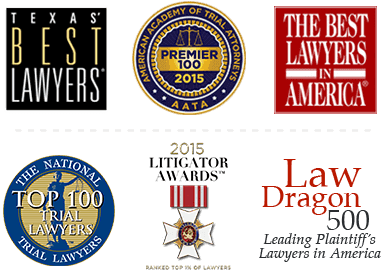Product Liability Attorneys in Houston, TX
(281) 283-8500It’s frustrating when a product is defective in a benign way, but sometimes a product’s defect can be actively dangerous – causing serious injury.
You use products every day. From the food you have for breakfast to the vehicle you drive to work, if any of the products you use are not designed and created as safely as possible, then they could cause you harm. When you are injured because of a defective or dangerous product, you may have the right to pursue compensation for your injuries. This is known as a product liability claim and can be based on numerous theories of liability.
Product liability cases are notoriously complex. If you believe you have been hurt by a defective product, contact our Houston product liability lawyers at The Krist Law Firm, P.C. as soon as possible. Use our online form or call 281-283-8500 to schedule your consultation.
Types of Product Defects
A product can be defective and dangerous in any number of ways leading to injuries and product liability claims. However, there are three overarching types of defects:
- Design Defect – If you believe the product that led to your injuries was defectively designed, you will need to show that the product is inherently dangerous when it is manufactured and used as intended. It is not that there was a fluke in the creation of the product. Instead, the defect arose during the design phase, and all of the products are made in a way that makes them dangerous for consumers.
- Manufacturing Defect – When a product has a manufacturing defect, it means it was created or assembled in a way that was not in accordance with the design and made the product dangerous when used as intended. In this situation, the product would not be dangerous if it were manufactured as it was designed. However, a mistake during the manufacturing process created a risk that one or more of the products would cause harm.
- Failure to Warn – A product may have a warning defect if there is a risk of harm when the product is used as intended, or in a reasonably foreseeable unintended way, yet it does not have the necessary warnings to inform you or other users about this risk. This is common when a product is designed and manufactured as safely as possible, yet still poses a risk to users.
Depending on your situation, your legal team may focus on one type of defect or multiple. It is possible that the product that caused your injuries was defective in more than one way. For instance, it may have been defectively designed and lack the appropriate warnings. Determining which type of defect you were injured by can require in-depth investigations and expert opinions. We can help with the complex process involved in a product liability case.
Common Product Liability Cases
Any product could be designed poorly or manufactured incorrectly. Even seemingly innocuous products could be designed, created, and sold without the proper warnings. However, there are certain types of products that often lead to product liability cases, including:
- Medical devices
- Prescription and over-the-counter drugs
- Vehicles
- Equipment and machinery
- Household products
- Children’s products
Damages for Product Liability Claims
If you were injured by a defective product, you may have the right to pursue damages through a product liability claim. Depending on a number of factors, you can seek compensation for your:
- Current and future medical expenses
- Loss of earning capacity
- Physical limitations
- Disfigurement
- Physical pain
- Mental anguish
You may also have the right to pursue punitive damages. These are intended to punish the wrongdoer and not to compensate you. Punitive damages are rare in product liability claims, however they may be available if you have evidence of the other party’s willfully malicious conduct.
A Common Issue in Product Liability Cases: Comparative Negligence
When you claim a business is responsible for your injuries because it designed or manufactured a defective or dangerous product, you can expect that company to fight back. One of the most common ways businesses’ defend themselves against product liability claims is based on what is known as comparative or contributory negligence. They will claim that your own actions are a significant part or all of the reason you are hurt. If the other party successfully proves you are more than 50 percent responsible, you will be prohibited from recovering compensation.
Theories of Liability
Not every product liability claim is based on the same theory of liability, which is the legal reason why the other party is responsible for your injuries. This is one of the reasons why product liability claims are so complex. You may be able to bring a product liability suit on the basis that the other party is liable for compensating you one or more reasons.
The theories of liability are:
Negligence
This is one of the most common theories of liability. You may argue that the other party is liable for compensating you because they acted in a way that was careless and unreasonable, or failed to act in a reasonable way, in light of the circumstances. Failing to uphold the appropriate standard of care is negligence. When this negligence results in your injuries, that party is responsible for making you whole again – or at least compensating you in an attempt to do so.
Breach of Warranty
The theory of liability known as a breach of warranty is based on contract law and applies to situations when the other party sold a defective or dangerous product. This theory of liability begins with the premises that there was an express or implied contract between you and the seller, and the seller made an explicit or implicit promise that the product was safe for its intended use. By proving that the product was not safe for its intended use, you can establish the seller violated this promise – they breached the warranty.
Strict Liability
Under the theories of negligence or breach of warranty, you are alleging the other party did something wrong. That is not the case under strict liability. In this type of case, you are not seeking to prove that the other party was careless, reckless, or acted in an intentionally harmful way. Instead, you are claiming the product was defective, the defect caused your injury, and the other party is responsible for the product and therefore your injuries.
The Product Liability Legal Process
If you believe you were injured by a defective or dangerous product, contact a product liability attorney as soon as possible. These types of legal claims are complicated and require experienced attorneys and expert witnesses. Our trusted attorneys at The Krist Law Firm, P.C. will guide you through the legal process, including:
Product Liability and Wrongful Death
If you lost your spouse, parent, or child because of a defective product, contact us today. The representative of the decedent’s estate may have the right to file a wrongful death claim on behalf of you and your other family members.
During this claim, the representative can pursue:
- Medical expenses
- Funeral and burial costs
- Loss of the family member’s financial contributions
- Loss of the family member’s care, support, maintenance, advice, and counsel
- Loss of the family member’s love, companionship, and comfort
- Loss of inheritance from that family member
- Physical pain and mental anguish
Scott C. Krist
Owner & Lead Trial Lawyer
Let Our Houston Product Liability Lawyers Help You
If you were injured by a defective product or a dangerous product caused the death of a loved one, do not hesitate to call us at The Krist Law Firm, P.C. We have decades of experience helping individuals recover compensation for injuries caused by defective and dangerous products. We will tenaciously fight for you to receive the maximum compensation you deserve under the law.
Contact us online or call 281-283-8500 to schedule a free, initial consultation.









